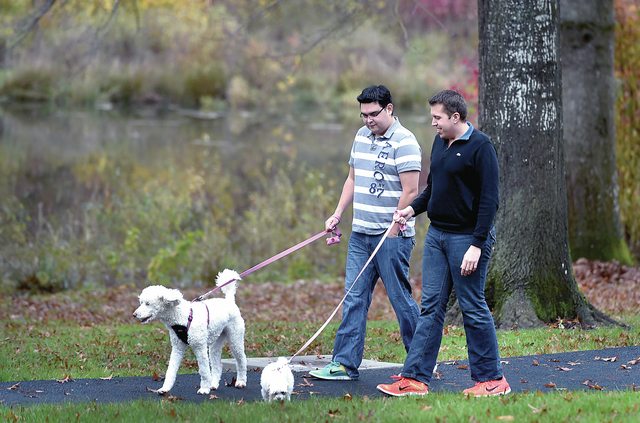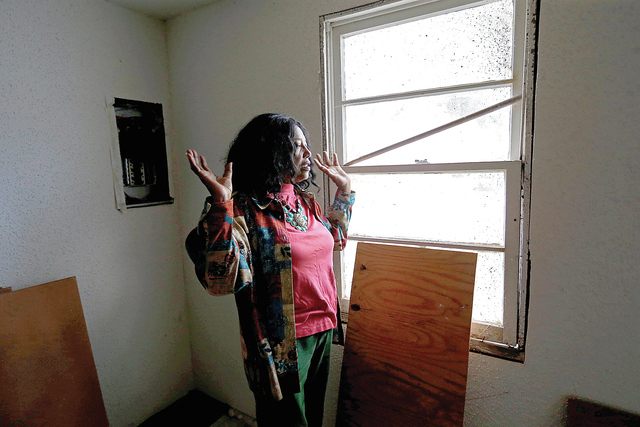Patchy reporting undercuts national hate crimes count
BOGALUSA, La. — The knock on the door, strong and quick, jolted Barbara Hicks Collins awake. It was the middle of the night. Someone must be in trouble, she thought. She flung open her front door to the shocking sight of her car engulfed in flames.
ADVERTISING
Investigators later determined someone had deliberately set fire to her Mercedes and also tried to burn down the one-story brick house she shared with her mother in this eastern Louisiana town, once known as a hotbed of Ku Klux Klan activity. Hicks Collins, a black woman, had no doubt the fire — set on Martin Luther King Jr. Day in 2012 — was racially motivated. Her father had been a prominent civil rights leader who filed lawsuits that desegregated local schools and forced police to protect protesters, and her family remained active in the community.
Despite the circumstances, the case was never counted in the nation’s annual tally of hate crimes. In fact, neither the police department nor the local sheriff has filed a hate crime report with the FBI since at least 2009.
And that’s not unusual, an investigation by The Associated Press found. The AP identified more than 2,700 city police and county sheriff’s departments across the country that have not submitted a single hate crime report for the FBI’s annual crime tally during the past six years — about 17 percent of all city and county law enforcement agencies nationwide.
Advocates worry that the lack of a comprehensive, annual accounting disguises the extent of bias crimes at a time of heightened racial, religious and ethnic tensions. The nation was stunned last June when nine black parishioners were shot dead at a Charleston, South Carolina, church, in an attack labeled a hate crime, and community groups have reported a notable increase in violence against Muslims and mosques in the wake of last year’s terror acts in Paris and San Bernardino, California. Gay and transgender people also are regular targets.
A better accounting of hate crimes, the FBI and other proponents say, would not only increase awareness but also boost efforts to combat such crimes with more resources for law enforcement training and community outreach.
“We need the reporting to happen,” said the Rev. Raphael Warnock, pastor of Atlanta’s historic Ebenezer Baptist Church, where King preached. “Without a diagnosis, we don’t know how serious the illness is. And without a diagnosis, there is no prescription. And without a prescription, there is no healing.”
The FBI defines a hate crime as a “criminal offense against a person or property motivated in whole or in part by an offender’s bias against a race, religion, disability, sexual orientation, ethnicity, gender, or gender identity.” Filing reports for the federal count is voluntary and guidelines call for reports to be submitted even if they list zero hate crimes, a signal to both the FBI and the community that local departments are taking such crimes seriously.
FBI Director James Comey has called on all agencies to do a more aggressive job tracking hate crimes, and also has initiated training sessions on bias attacks for hundreds of law enforcement officers nationwide.
In response to an inquiry about Hicks Collins’ case, officials with both the Bogalusa Police and the Washington Parish Sheriff’s Department said they did not know hate crime information was not being reported and blamed clerical errors.
Four years later, no arrests have been made in the attack on her house and the state fire marshal’s office, which ultimately conducted the investigation, said it was unable to determine whether the setting of the fires constituted a hate crime or not.
Under FBI guidelines, an incident should be reported as a suspected hate crime if a “reasonable and prudent” person would conclude a crime was motivated by bias. Among the criteria for evaluation is whether an incident coincided with a significant holiday or date, specifically citing the King holiday. A suspect need not be identified to meet the threshold for reporting.
For Hicks Collins, the failure to count the 2012 attack as a hate crime is a painful reminder of the continuing struggle for racial progress.
“The more things change,” she said, “the more they remain the same.”
Between 5,000 and 7,000 hate crime incidents are catalogued each year in the FBI report, with nearly half of all victims in recent years targeted because of their race.
Reporting spotty for many agencies
The AP examined FBI hate crime reports for the years 2009 through 2014 and matched those against lists of every city and county law enforcement agency in each state, obtained separately from all 50 states.
An analysis revealed that law enforcement reporting is spotty even beyond the more than 2,700 agencies that never filed even a single hate crime report. For example, thousands of city police and county sheriff’s departments — which handle the vast majority of local law enforcement responses and investigations — reported in some years but not others. And, in some cases, departments reported for, say, only one quarter of a year without submitting reports covering the rest of that span.
Some agencies said they thought they were reporting, even though they were not, and some thought they didn’t have to file reports because they hadn’t investigated any hate crimes. Others that oversee jails might have assumed they were exempt because they don’t patrol the streets, but the FBI encourages reporting by all law enforcement agencies whose officers are empowered to make arrests.
The vast majority of the departments that did not file any reports during the six-year period represented small towns, often consisting of just a few thousand residents or less. But the list also included the Multnomah County Sheriff’s Office, which handles law enforcement in a heavily populated and sprawling region around Portland, Oregon.
A number of larger cities with a history of racial troubles also were missing, including Birmingham, Alabama; Jackson, Mississippi; and Baton Rouge, Louisiana.
Jackson Police did not file any hate crimes information to the FBI between 2009 and 2012, followed by only spotty reporting the next two years. And yet, during that time, state and federal charges were filed in connection with the June 2011 death of James Craig Anderson, a black man who was beaten and run over by a truck containing a group of white teenagers, some of whom yelled racial epithets during the assault.
Jackson Police spokeswoman Colendula D. Green insisted the FBI investigates potential hate crimes in the city and thus would be the reporting agency, even though that is not what the guidelines specify. A Birmingham Police spokesman said his agency had submitted the reports to the state, and it was unclear why they didn’t make it to the FBI.
The statistics analyzed by the AP also revealed wide disparities in how seriously states take the reporting. Nationwide, there were 16 states in which more than 25 percent of local law enforcement agencies did not appear at all in the FBI hate crime database between 2009 and 2014. That included 64 percent of agencies in Mississippi and 59 percent in Louisiana.
In March 2009 in Lafourche Parish, Louisiana, nine inmates were charged with hate crimes following three attacks at the Lafourche Parish Detention Center, but the sheriff’s office is among the agencies submitting no information in the six-year span the AP studied.
Sheriff’s Sgt. Brennan Matherne said his agency had been directed to report crimes through the state crime reporting system based on the most significant charge, and that hate crimes are considered a secondary offense. He said the sheriff’s office would review the process going forward.
He noted that the department had recorded 17 hate crimes locally in 2009, three in 2010, three in 2011, six in 2012 and three in 2013.
The AP’s analysis determined that some states clearly make reporting a priority. In Nevada, not a single police or sheriff’s department failed to report for all six years. In two of the nation’s most populous and diverse states, California and Florida, compliance also is nearly universal.
Nearly all the roughly 350 local law enforcement agencies in Tennessee routinely file.
Victims fail to come forward
It’s not just law enforcement departments that fail to report hate crimes. Many victims do not report them either.
The U.S. Bureau of Justice Statistics projected that just 40 percent of the “hate crime victimizations” it recorded in 2012 were reported to authorities. Among the top reasons given for staying silent, the agency said: fears of reprisals, a feeling that “police could not or would not help,” or the incident being considered a personal or private matter.
In recent years, members of the Sikh community have been targeted by attackers who, in some cases, confused them with Muslims because of their turbans or other head coverings. But S. Gulbarg Singh Basi, chairman of the American Sikh Council, said that some in his community fear that reporting those incidents might invite even more hate crimes.
“‘Keep your eyes closed and the problem will go away,’” said Basi.
“I’m not saying that is right, but quite a few people think that.”
Attacked couple hopes for better future
David Beltier and his boyfriend were on an afternoon walk with their standard poodle, Beauty, in the Portland suburb of Hillsboro in March 2013. Beauty’s fur had been dyed a light pink color, and a few passers-by already had made derogatory remarks.
Then a man yelling gay slurs out the window of an SUV made a U-turn, headed straight for Beltier and his boyfriend. Beltier said he seemed determined to fight, so he told his boyfriend to take Beauty and get away.
Beltier, who had martial arts training, was able to block most of the man’s punches, but the assailant then grabbed a metal tool from his SUV and hit Beltier in the head.
The man was arrested and ultimately faced a federal hate crime charge, in addition to state charges. After a federal jury deadlocked, he pleaded guilty to an assault charge in state court and the federal case was dismissed.
Yet what happened to Beltier was never included in the FBI’s national hate crimes report because the Hillsboro Police Department was among those found to be not reporting.
Hillsboro Police Lt. Michael Rouches blamed the lapse on a technical problem between his department and the state, and said the problem was discovered last year when the department was in the process of applying for a grant and noticed the data was missing.
The lack of reporting should not suggest the department didn’t aggressively investigate what happened to Beltier and his boyfriend, Rouches said.
“We ran with it as soon as we got it, and we got to the bottom of it,” he said.
To this day, however, Beltier avoids walking in the dark and hates to be alone, although he takes comfort from the bystanders who stopped to help him and tracked down his assailant. He wants to know that future hate crimes will be reported.
“The community needs to be aware that this is happening in their own town,” he said. “It will give everyone the chance to help fix it and bring a better future.”




